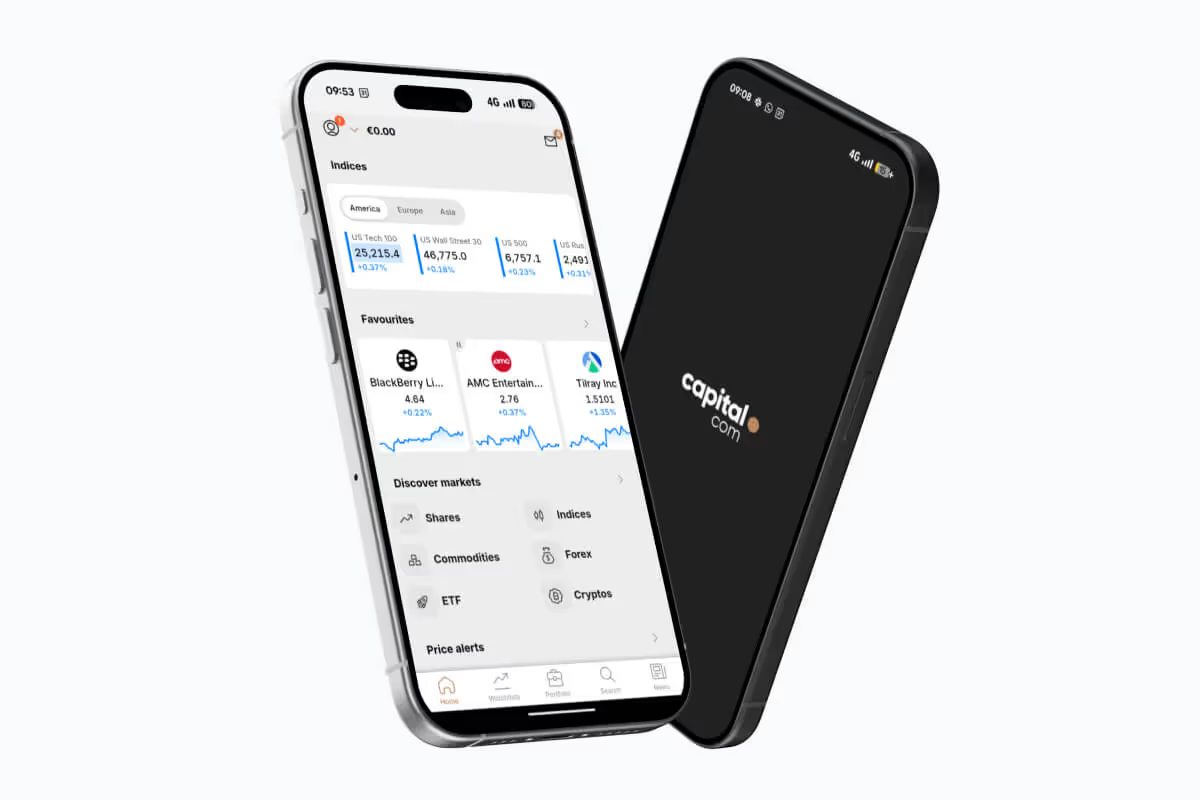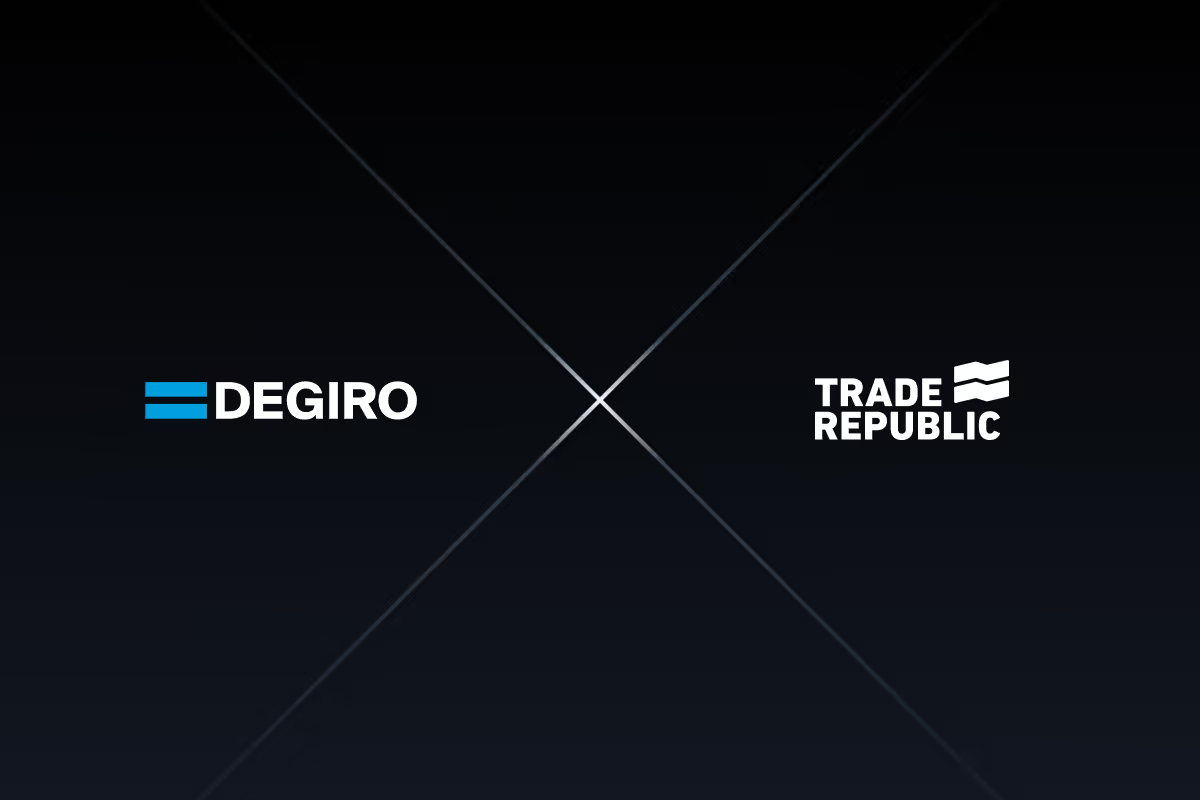Trading 212 vs Interactive Brokers (IBKR): Który jest najlepszy dla Polaków w 2025 roku?
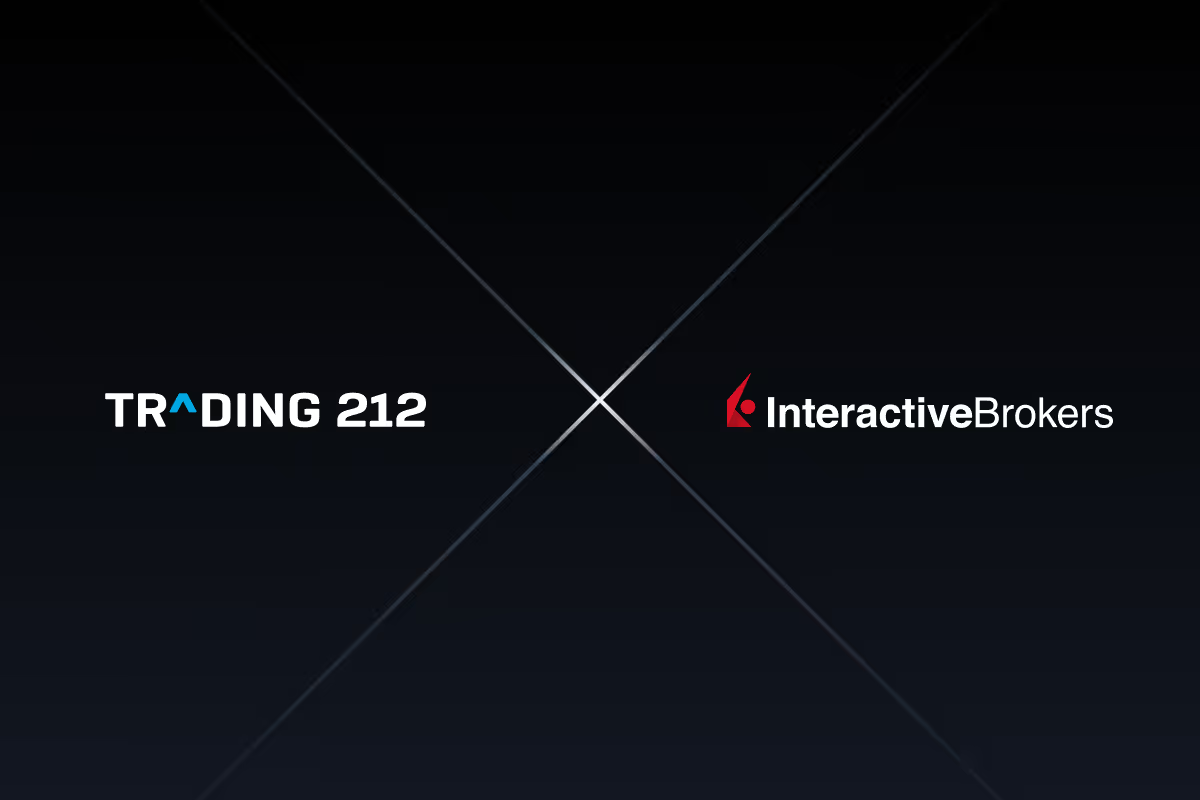


Zarówno Trading 212, jak i Interactive Brokers są znane na rynku w Polsce, choć ten drugi nie inwestuje tak dużo w reklamę skierowaną do polskich inwestorów jak pierwszy.
Więc który jest lepszy? Korzystamy z obu i zauważamy, że każdy ma swoje unikalne cechy, zalety i wady. W tym artykule podzielimy się naszymi doświadczeniami z obydwoma.
Celem jest pomoc w zrozumieniu, która z tych dwóch platform może być dla Ciebie bardziej odpowiednia, w zależności od Twoich potrzeb. Szczegółowo omówimy wszystko, co Trading 212 i Interactive Brokers mają do zaoferowania.
Podsumowanie
- Trading 212: Najlepszy do inwestowania w akcje i ETFs bez prowizji (bez limitu) oraz do zarabiania odsetek od niewykorzystanej gotówki i pożyczonych akcji.
- Interactive Brokers (IBKR): Najlepszy wybór dla szerszej gamy produktów (obligacje, opcje itp.) oraz dla osób o wyższej wartości majątku.
Który jest najlepszy?
Czujemy się komfortowo, inwestując u obu brokerów.
Trading 212 to najlepszy wybór do inwestowania w akcje i ETFs bez prowizji (bez limitów) oraz do zarabiania odsetek od niewykorzystanych środków i wypożyczonych akcji.
Aplikacja Trading 212 wydaje nam się też nieco bardziej intuicyjna niż IBKR (Mobile i GlobalTrader), co czyni ją idealną dla początkujących. Dodatkowym atutem jest to, że Trading 212 oferuje wirtualną kartę debetową do zakupów oraz cashback.
Z kolei Interactive Brokers to najlepsza opcja dla osób szukających ekspozycji na inne typy aktywów, takie jak obligacje i opcje, oraz dla bardziej doświadczonych inwestorów.
Jest powszechnie znany z tego, że korzystają z niego inwestorzy o wysokiej wartości majątku — nie tylko ze względu na sprawdzone bezpieczeństwo (broker działa od 1978 r.), lecz także z powodu niższych spreadów, które przy większych kwotach transakcji w pełni rekompensują płacone prowizje.
Interactive Brokers to największy broker w Europie pod względem aktywów w zarządzaniu.
Uwaga: Trading 212 korzysta z Interactive Brokers jako depozytariusza. Oznacza to, że aktywa klientów Trading 212 są przechowywane na rachunku zbiorczym (omnibus) w Interactive Brokers.
Tabela porównawcza
Przegląd Trading 212
Założona w 2004 roku, Trading 212 była jednym z pionierów w oferowaniu niskich prowizji i uproszczonego dostępu do rynków finansowych dla polskich inwestorów. Firma ma siedzibę w Wielkiej Brytanii, a dla polskich klientów działa poprzez spółkę Trading 212 Markets Ltd., która jest regulowana przez bułgarską Komisję Nadzoru Finansowego (FSC).
Trading 212 zyskał popularność dzięki przyjaznej platformie inwestycyjnej, możliwości inwestowania już od 1 zł oraz promocji powitalnej.
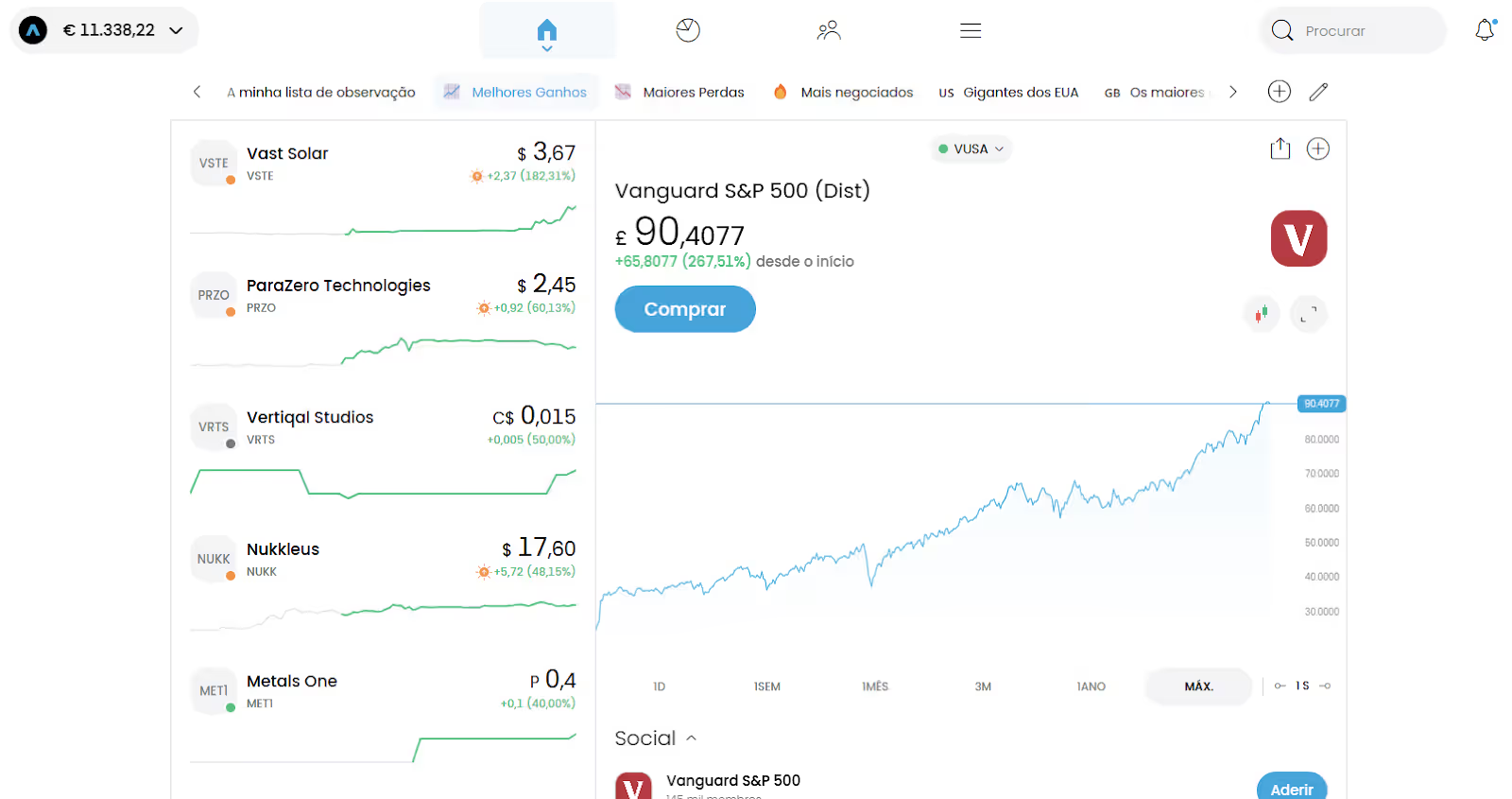
Jedną z głównych zalet Trading 212 w porównaniu z Interactive Brokers jest bardziej intuicyjny interfejs, lepiej dostosowany do początkujących, a także możliwość korzystania z karty debetowej i otrzymywania cashbacku za zakupy.
Chcesz wiedzieć więcej? Sprawdź nasze dedykowane artykuły:
- Czy Trading 212 jest bezpieczny?
- Jak inwestować w S&P 500 za pomocą Trading 212
- Trading 212 opinie 2025: odsetki, opłaty i bezpieczeństwo
Zalety i wady Trading 212
Zalety
- Handel akcjami i ETFs bez prowizji (mogą obowiązywać inne opłaty – sprawdź warunki i opłaty).
- Funkcjonalność AutoInvest i Pies do zautomatyzowanego inwestowania.
- Szybki i łatwy proces otwierania konta.
- Dostępne konto demo.
- Oferuje ułamek akcji o wartości do 100 zł dla nowych klientów.
- Oferuje wirtualną kartę debetową z cashbackiem.
- Wysokie oprocentowanie niewykorzystanych środków pieniężnych.
- Odsetki od pożyczonych akcji.
- Nowoczesna i łatwa w użyciu aplikacja.
Wady
- Ograniczone portfolio produktów (brak opcji, obligacji, funduszy inwestycyjnych ani kontraktów futures).
- Opłata za przewalutowanie w wysokości 0,15%.
- Brak odpowiednich narzędzi fundamentalnych.
- Jako spółka prywatna nie podlega takiemu samemu poziomowi kontroli i przejrzystości jak Interactive Brokers.
- Brak licencji bankowej dla większości polskich klientów (obecnie dostępna tylko dla klientów z Niemiec).
Przegląd Interactive Brokers
Interactive Brokers (IBKR), założony w 1978 roku i notowany na NASDAQ (ticker IBKR), bywa często nazywany „Ferrari” wśród platform brokerskich.
Chociaż jego flagowa platforma Trader Workstation (TWS) jest skierowana do profesjonalistów, Client Portal i mobilna aplikacja IBKR GlobalTrader sprawiają, że jest ona dostępna także dla początkujących:
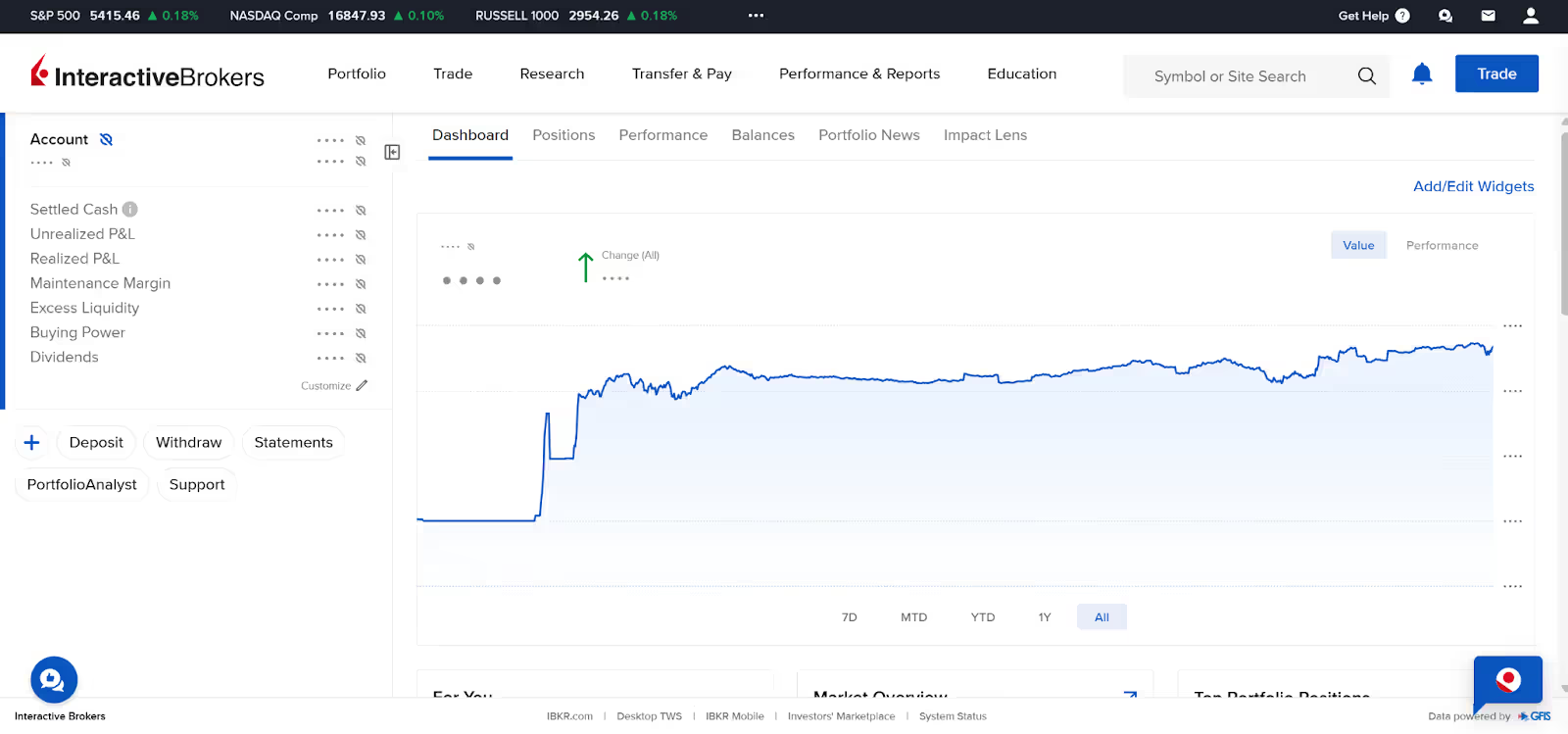
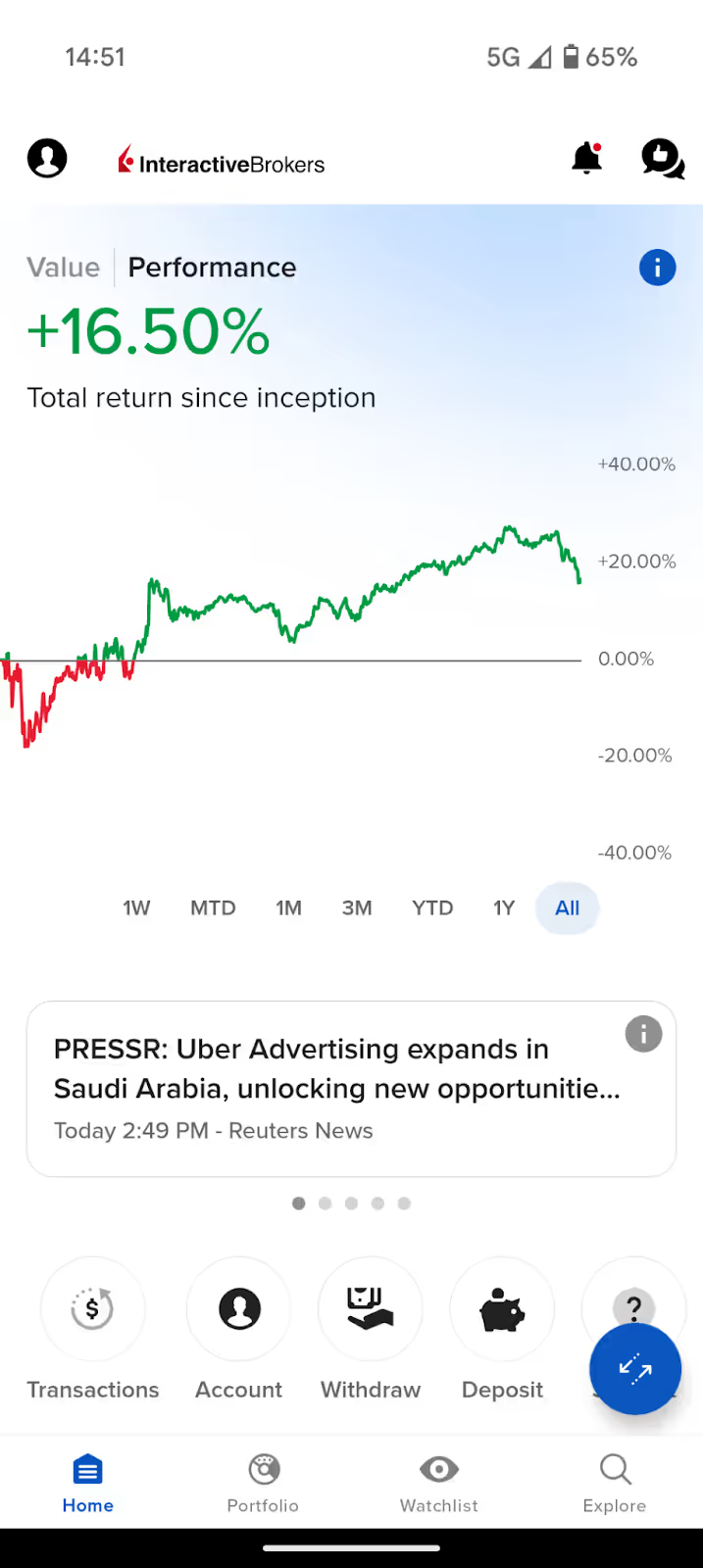
IBKR jest polecany osobom, które chcą długoterminowo inwestować w akcje i ETFs, poznawać bardziej „egzotyczne” instrumenty (np. opcje) lub cenią konkurencyjne kursy wymiany oraz zaawansowane narzędzia do zarządzania portfelem, w tym dostęp do jego zaawansowanej platformy Trader Workstation (TWS).
Mimo że IBKR oferuje bardziej złożone platformy, ma też prostsze, takie jak aplikacja mobilna i wersja webowa.
Krótko mówiąc, to świetny wybór dla polskich inwestorów szukających bezpiecznej, nowoczesnej aplikacji inwestycyjnej umożliwiającej inwestowanie na rynkach globalnych.
Jeśli chcesz poznać więcej szczegółów, przeczytaj naszą Interactive Brokers opinie.
Interactive Brokers — zalety i wady
Zalety
- Ultraniskie prowizje na akcje, ETFs i opcje
- Największy broker w Europie pod względem aktywów pod zarządzaniem
- Najs szerszy zakres produktów i rynków w branży
- Darmowe konto demo
- Znakomita reputacja (od 1978 r.)
- Rozbudowane narzędzia do badań i edukacji
- Przyjazna dla początkujących aplikacja IBKR GlobalTrader
- Płaci odsetki od niewykorzystanych sald gotówkowych
Wady
- Otwarcie konta może być długie i złożone
- Bardziej stroma krzywa uczenia (zwłaszcza w TWS)
- Nawigacja na stronie bywa czasami myląca
- Brak odsetek od niewykorzystanych środków poniżej 10 000 zł
Regulacje i bezpieczeństwo
IBKR zapewnia wyższy poziom przejrzystości, ponieważ jest notowany na NASDAQ, co gwarantuje bardziej rygorystyczną kontrolę jego sprawozdań finansowych. Trading 212 jest prywatną spółką.
Chcesz wiedzieć więcej o bezpieczeństwie Trading 212? Przeczytaj nasz szczegółowy artykuł: Czy inwestowanie z Trading 212 jest bezpieczne?.
Instrumenty finansowe
Jeśli chcesz inwestować w akcje lub ETFs niewielkimi kwotami (< 1 000 zł na transakcję), Trading 212 spełni Twoje oczekiwania. Jeśli jednak potrzebujesz dostępu do większej liczby instrumentów i planujesz inwestować większe kwoty, lepszym wyborem będzie Interactive Brokers.
Platformy inwestycyjne
Platforma inwestycyjna Trading 212 jest prosta i intuicyjna.
Interactive Brokers jest inne, ponieważ oferuje kilka platform.
- Chcesz prostą aplikację? Trading 212 to dobry wybór.
- Wolisz poważniejszą platformę inwestycyjną? IBKR zwykle sprawdza się lepiej. W ramach IBKR masz do wyboru wiele platform, w zależności od poziomu doświadczenia.
Opłaty
Tabela pokazuje, że Trading 212 jest bardziej konkurencyjny dla okazjonalnych lub początkujących inwestorów, ponieważ oferuje 0% prowizji na akcje i ETFs oraz proste opłaty.
Tymczasem Interactive Brokers pobiera opłatę za każdą transakcję, ale oferuje znacznie niższe koszty przewalutowania oraz dostęp do dużo szerszej gamy instrumentów (obligacje, opcje itp.), co czyni go bardziej odpowiednim wyborem dla aktywnych i zdywersyfikowanych inwestorów.
Obsługa klienta
Trading 212
Obsługa klienta dla polskich użytkowników odbywa się głównie przez:
- E-mail: Czas odpowiedzi zależy od natężenia zgłoszeń.
- Czat: Dostępne w platformie.
Chociaż obsługa jest funkcjonalna w przypadku podstawowych zapytań, nie ma wsparcia telefonicznego, co może być niekorzystne dla użytkowników preferujących bezpośredni kontakt. Ponadto niektóre kwestie techniczne lub specyficzne mogą nie być rozwiązywane tak szybko ani tak szczegółowo, jak można by oczekiwać.
Interactive Brokers
Obsługa klienta jest dostępna poprzez:
- Zgłoszenia: Zazwyczaj szczegółowe odpowiedzi, ale czas oczekiwania może się różnić.
- IBot: Narzędzie oparte na AI, które odpowiada na szeroki zakres pytań.
Ogólnie wsparcie IBKR jest uznawane za kompetentne i technicznie solidne, jednak dla początkujących może wydawać się mniej przystępne ze względu na częste używanie terminologii technicznej oraz bardziej złożoną strukturę brokera.
Którą opcję powinieneś wybrać?
Wybór między Trading 212 a Interactive Brokers zależy przede wszystkim od Twoich konkretnych potrzeb. Obaj brokerzy mają unikalne zalety, które sprawiają, że są atrakcyjni w różnych kontekstach.
- Trading 212 jest cenione za prostotę i przyjazną dla użytkownika platformę, idealną dla początkujących inwestorów. Oferuje także inwestowanie bez prowizji w akcje, ETFs i kryptowaluty (bez limitów) oraz umożliwia zarabianie odsetek od niewykorzystanej gotówki i wypożyczonych akcji.
- Interactive Brokers oferuje szerszy zakres produktów finansowych, w tym obligacje i opcje, oraz konkurencyjną strukturę prowizji, zwłaszcza dla inwestorów dysponujących większym kapitałem. Ma też przewagę w postaci większej przejrzystości, ponieważ jest spółką notowaną na giełdzie.
Niezależnie od wyboru, obaj brokerzy są regulowani i oferują usługi spełniające wymagania większości inwestorów. Najważniejsze jest przeanalizowanie swoich celów finansowych, stylu inwestowania oraz zapoznanie się z funkcjami obu platform przed podjęciem decyzji.
Jeśli to możliwe, równoległe przetestowanie obu platform to świetny sposób, aby sprawdzić, która najlepiej do Ciebie pasuje.
Jeśli chcesz poznać inne opcje, sprawdź nasz ranking najpopularniejszych brokerów w Europie.




